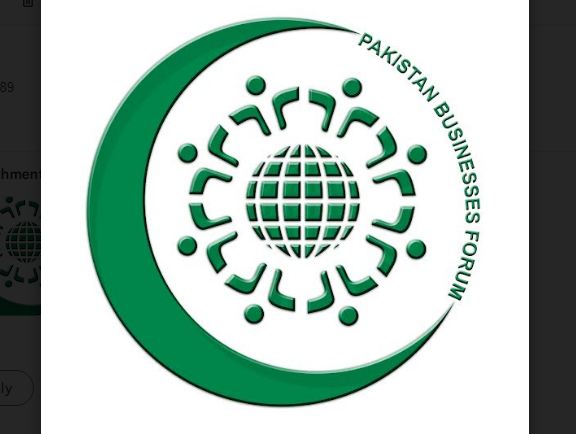PBF demands growth oriented budget for the economy in 2023-24
 DNA
Karachi, MAY 12: Pakistan Business Forum (PBF) suggested the government to take effective economic measures including in the coming federal budget to encourage business activities in the country with a flavour of austerity measures in the public sectors.
Sharing the Forum’s proposals for upcoming federal budget 2023-24 with media, PBF President Mian M. Usman Zulfiqar along with core committee members stressed the need for establishing export warehouses at the borders to uplift trade with neighboring countries and incorporating the agriculture and service sectors into the tax net.
In an effort to increase the GDP growth up to six percent in next financial year, the budget makers have to reduce tax rates to widen the tax base and curtail parallel economy, also providing a competitive edge to Pakistan’s products in global markets.
PBF Senior officials Shabnam Zafar, Muhammad Naseer Malik, Zubaida Jalal, Muhammad Atif Haleem, Mir Murad Talpur and Daroo Khan Achakzai were also present.
President Muhammad Usman said the PBF was giving its proposals for the federal budget 2023-24 with main focus on jobs creation by strengthening industry, broadening of tax base through lowering rate and introducing liberal policies to attract foreign investment.
During the last three decades, he said, it was only thrice when Pakistan’s economy grew by more than 5 percent –first in 2003-2006 and second during 2016-2018 and third during 2021-22. He said that realizing the full potential of information technology, the industrial production can be increased. He observed that the digital finance potential of Pakistan could be $36 billion in next four years, giving a seven percent boost to the GDP and generating four million new jobs.
PBF President said the real fact is a lack of realization that the world business patterns have changed and Pakistan has made no efforts to adjust to those realities. If the country wants to have a higher growth rate, it would have to adopt new innovative ways in the post-pandemic world as is being done by other countries, which are expecting a fast V-shaped recovery. “We need to bring our digital infrastructure at par with other fast developing countries, besides adopting new technologies and implementing e-government solutions,” he suggested.
Similarly PBF has recommended the government to abolish the Super Tax which was imposed on companies earning more than Rs. 150 million last year. Cement, steel, sugar, oil and gas, fertilizers, textiles, automobiles, tobacco, and other industries were among them. PBF President also urged the general rate of Minimum Tax u/s 113 of ITO 2001 to be reduced from 1.25 percent to 0.25 percent. “Considering current economic turmoil and inflationary pressure on prices and cost, the minimum tax should be abolished, at least for listed companies,” it added, among other recommendations.
PBF Vice President Jahanara Wattoo proposed the economic managers to incentivise investors, simplify tax system and take solid step to reform the tax collecting agency.
She expressed serious concern over excessively burdening the manufacturing sector that contributes more than 20 percent to the economy, having a share of 70 percent in tax payments.
Wattoo suggested the authorities to rationalize import tariff, which was unlike any other competing country.
She urged the government to take practical and concrete steps for the implementation of business-friendly policies, saying that high prices of utilities like electricity, gas and petroleum products were slowing down the wheel of economy. She added there was a need to freeze the prices of those inputs for at least three years so that the economy could get required jumpstart.
She also suggested that the sales tax slab should immediately be curtailed in order to reduce cost of production and inflationary pressures. “The PBF urges the government to reduce sales tax to single digit and also cut corporate tax to make the upcoming budget business-friendly,”
As the lower rate of sales tax will increase revenue and discourage malpractices in input and adjustment. It will give the industry a breathing space against the menace of smuggling.
However in order to tackle the energy shortages, maximum funds should be allocated for construction of dams or water reservoirs because country is in dire need of an urgent shift in its energy-mix in favour of Hydro power and local fuels, she added.
On this occasion, PBF Vice President/CEO Chaudhry Ahmad Jawad said the slowing down of agriculture sector growth is causing serious repercussions on all aspects of the economy including inflation, poverty, employment, income distribution, current account and food security. In this regard government must announce tangible steps in the upcoming federal budget including curtailment of fertilizer prices and electricity tariff on tube-wells – aimed at bringing down high prices of agriculture inputs.
Jawad proposed that the government may announce concrete package in the budget for the facilitation of horticulture industry as its global trade crossed $250 billion.
He said that the government should allocate funds to promote the hybrid seed industry in Pakistan under private-public partnership to increase per-acre productivity. “The world is focusing on the use of certified seed for enhancing agriculture productivity due to better profitability and international recognition.”
Ahmad Jawad urged setting up different projects including cool chain infrastructure, ripening centres, food processing and value addition industry, agro-processing industry and accredited testing laboratories at special economic zones under Public Private Partnership (PPP) mode, to ensure availability of good quality produce for exports.
The government should incentivise businessmen to invest in latest cold storages as it was a vital part of the supply chain for exporting fruits and vegetables as well as for local markets with a tax exception for five years; to chase the target of 900 straight of the art cold storages, he added.
Additionally, he said, loan scheme for new agriculture graduates for promoting agriculture services should also be government’s priority in the budget. Similarly, special mark-up rate could be announced for the banks preferably at 5% in the budget to purchase agriculture machinery for the facilitation of the farming community. Further farm to market; Khadim-e-Pakistan Dehi Roads and further it’s time to get Arahthi registration. “We will get taxes, benefit farmers”.
Jawad also demanded that funds for Crop Insurance Scheme (CIS) may also be allocated in the provincial budgets for farmers to the areas affected by natural disasters/calamities, wide-spread diseases and unpredictable weather conditions in a transparent manner with a assurance of merit, through Sindh Bank, Bank of Punjab, Bank of Khyber and Zarai Taraqiati Bank Limited (ZTBL).
DNA
Karachi, MAY 12: Pakistan Business Forum (PBF) suggested the government to take effective economic measures including in the coming federal budget to encourage business activities in the country with a flavour of austerity measures in the public sectors.
Sharing the Forum’s proposals for upcoming federal budget 2023-24 with media, PBF President Mian M. Usman Zulfiqar along with core committee members stressed the need for establishing export warehouses at the borders to uplift trade with neighboring countries and incorporating the agriculture and service sectors into the tax net.
In an effort to increase the GDP growth up to six percent in next financial year, the budget makers have to reduce tax rates to widen the tax base and curtail parallel economy, also providing a competitive edge to Pakistan’s products in global markets.
PBF Senior officials Shabnam Zafar, Muhammad Naseer Malik, Zubaida Jalal, Muhammad Atif Haleem, Mir Murad Talpur and Daroo Khan Achakzai were also present.
President Muhammad Usman said the PBF was giving its proposals for the federal budget 2023-24 with main focus on jobs creation by strengthening industry, broadening of tax base through lowering rate and introducing liberal policies to attract foreign investment.
During the last three decades, he said, it was only thrice when Pakistan’s economy grew by more than 5 percent –first in 2003-2006 and second during 2016-2018 and third during 2021-22. He said that realizing the full potential of information technology, the industrial production can be increased. He observed that the digital finance potential of Pakistan could be $36 billion in next four years, giving a seven percent boost to the GDP and generating four million new jobs.
PBF President said the real fact is a lack of realization that the world business patterns have changed and Pakistan has made no efforts to adjust to those realities. If the country wants to have a higher growth rate, it would have to adopt new innovative ways in the post-pandemic world as is being done by other countries, which are expecting a fast V-shaped recovery. “We need to bring our digital infrastructure at par with other fast developing countries, besides adopting new technologies and implementing e-government solutions,” he suggested.
Similarly PBF has recommended the government to abolish the Super Tax which was imposed on companies earning more than Rs. 150 million last year. Cement, steel, sugar, oil and gas, fertilizers, textiles, automobiles, tobacco, and other industries were among them. PBF President also urged the general rate of Minimum Tax u/s 113 of ITO 2001 to be reduced from 1.25 percent to 0.25 percent. “Considering current economic turmoil and inflationary pressure on prices and cost, the minimum tax should be abolished, at least for listed companies,” it added, among other recommendations.
PBF Vice President Jahanara Wattoo proposed the economic managers to incentivise investors, simplify tax system and take solid step to reform the tax collecting agency.
She expressed serious concern over excessively burdening the manufacturing sector that contributes more than 20 percent to the economy, having a share of 70 percent in tax payments.
Wattoo suggested the authorities to rationalize import tariff, which was unlike any other competing country.
She urged the government to take practical and concrete steps for the implementation of business-friendly policies, saying that high prices of utilities like electricity, gas and petroleum products were slowing down the wheel of economy. She added there was a need to freeze the prices of those inputs for at least three years so that the economy could get required jumpstart.
She also suggested that the sales tax slab should immediately be curtailed in order to reduce cost of production and inflationary pressures. “The PBF urges the government to reduce sales tax to single digit and also cut corporate tax to make the upcoming budget business-friendly,”
As the lower rate of sales tax will increase revenue and discourage malpractices in input and adjustment. It will give the industry a breathing space against the menace of smuggling.
However in order to tackle the energy shortages, maximum funds should be allocated for construction of dams or water reservoirs because country is in dire need of an urgent shift in its energy-mix in favour of Hydro power and local fuels, she added.
On this occasion, PBF Vice President/CEO Chaudhry Ahmad Jawad said the slowing down of agriculture sector growth is causing serious repercussions on all aspects of the economy including inflation, poverty, employment, income distribution, current account and food security. In this regard government must announce tangible steps in the upcoming federal budget including curtailment of fertilizer prices and electricity tariff on tube-wells – aimed at bringing down high prices of agriculture inputs.
Jawad proposed that the government may announce concrete package in the budget for the facilitation of horticulture industry as its global trade crossed $250 billion.
He said that the government should allocate funds to promote the hybrid seed industry in Pakistan under private-public partnership to increase per-acre productivity. “The world is focusing on the use of certified seed for enhancing agriculture productivity due to better profitability and international recognition.”
Ahmad Jawad urged setting up different projects including cool chain infrastructure, ripening centres, food processing and value addition industry, agro-processing industry and accredited testing laboratories at special economic zones under Public Private Partnership (PPP) mode, to ensure availability of good quality produce for exports.
The government should incentivise businessmen to invest in latest cold storages as it was a vital part of the supply chain for exporting fruits and vegetables as well as for local markets with a tax exception for five years; to chase the target of 900 straight of the art cold storages, he added.
Additionally, he said, loan scheme for new agriculture graduates for promoting agriculture services should also be government’s priority in the budget. Similarly, special mark-up rate could be announced for the banks preferably at 5% in the budget to purchase agriculture machinery for the facilitation of the farming community. Further farm to market; Khadim-e-Pakistan Dehi Roads and further it’s time to get Arahthi registration. “We will get taxes, benefit farmers”.
Jawad also demanded that funds for Crop Insurance Scheme (CIS) may also be allocated in the provincial budgets for farmers to the areas affected by natural disasters/calamities, wide-spread diseases and unpredictable weather conditions in a transparent manner with a assurance of merit, through Sindh Bank, Bank of Punjab, Bank of Khyber and Zarai Taraqiati Bank Limited (ZTBL).
« CJP Bandial-led bench to take up ECP’s plea seeking review of Punjab polls order on Monday (Previous News)
(Next News) Murad Saeed’s residence raided in Swat »
Related News

Dar extends sympathy to UAE over torrential rains devastation
ISLAMABAD, APR 24: /DNA/ – Foreign Minister of Pakistan, Ishaq Dar held telephone conversation withRead More

PTI blasts FO for silence over US warning of imposing sanctions for doing business with Iran
Govt should issue befitting, solid response to US administration threatening statement ISLAMABAD: /DNA/ – PakistanRead More


Comments are Closed